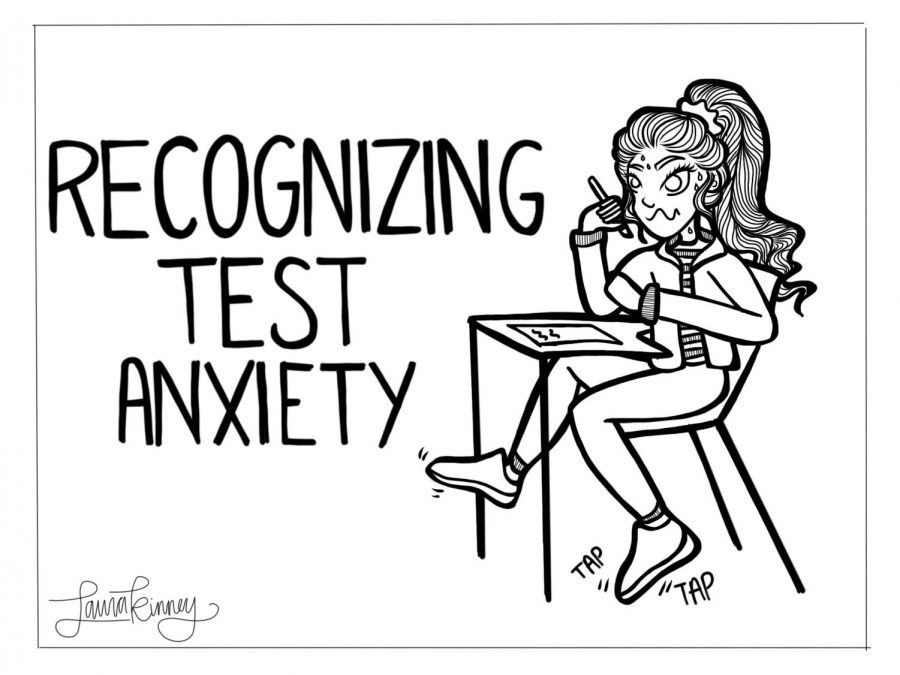Recognizing Test Anxiety
Recognizing Test Anxiety
March 21, 2019
Platteview students recently kicked off their fourth quarter of the 2018-2019 school year with Nebraska’s annual standardized testing. On March 6th and 8th, 2019, students in grades 9 and 10 participated in the state-wide Nebraska MAP test (a standardized test which tracks and measures student growth with personalized assessments to accurately track educational improvement). Furthermore, the juniors at PHS took the Pre-ACT. For some, standardized testing is a comfortable and easy process with little to no pressure; however, others may find any form of testing to be a stressful challenge. Many teenagers often struggle in test-taking environments due to an excessive feeling of nervousness and panic. In a world where testing is extremely common (whether it be standardized testing, the ACT/SAT, final exams, or even an everyday classroom test), many teenagers must face the repercussions of test anxiety.

Test anxiety is a feeling of worry, nervousness, or unease, typically about an imminent event/exam with an uncertain outcome. This constant worry can produce serious health and performance issues for students. With testing days quickly approaching (ie. ACT and Pre-ACT on April 2nd, 2019), it is important for Platteview students and staff to recognize mental health among students to prevent the serious consequences that accompany test anxiety.
Both teenagers and adults often dismiss mental wellness associated with teenagers’ busy lives, but to maintain a healthy and happy educational experience it is necessary to recognize and prioritize mental health. Some may not realize the severity of one’s mental wellbeing, for it can greatly impact an individual’s physical qualities and bodily functions. When one’s mental wellness wearies, their body itself will begin to face serious consequences. In minor cases, some students with test anxiety often hold tension in their neck and shoulders, causing general body discomfort. Some even suffer from extreme chest and facial pain which is described similar to the feeling of “an electric shock.” Even audio operations can be affected, with the sensation of pulsing in the ear and experiencing tinnitus (eg. hearing a high-pitched ringing, clicking, or hiss).

According to Dr. Aliza Werner-Seilder (a professor at the University of New South Wales), mental wellness does not only affect physical health, but it also affects a student’s schoolwork performance. Mental health problems in children and adolescents have been shown to contribute to lower achievements in education and increases the rates of engagement in health risk behaviors, self-harm, and suicide (which can persist into adult-hood). Thus, prevention of mental health issues in children and adolescents is integral to promoting positive life outcomes for young people. For more information visit: www.sciencedirect.com/science/article/pii/S0272735815301409
Emotional health specialist Heidi J. Lyneham (with Macquarie University) reports over the past seven years, anxiety has become the #1 reason college students seek counseling. Anxiety disorders affect 25% of teenagers, a percentage that has steadily risen over the past 30 years and is showing no sign of slowing down. More time on social media yields more emotional distress. Constant scrolling and social comparison bring up thoughts such as, “I’m not good enough, happy enough, smart enough, good-looking enough, etc.” For more information visit: www.sciencedirect.com/science/article/abs/pii/S0887618507000643

Even teenagers who are not diagnosed with test anxiety still experience the nerves test taking may bring. Platteview freshman Emma Middleton believes the ACT is a stressful test for many students due to the fact it is a “deciding factor on if and where [one] goes to college.” Despite students’, teachers’, and administrators’ encouragement to excel on standardized tests, Kenzie Johnson, a junior at Platteview, hopes to calm her peers’ fears when it comes to standardized test taking: “[The MAP test] doesn’t count towards a grade, so it doesn’t matter if [one] does good or bad on it.”
Students Jacob Muff, Pruett Newton, and Tate Muff shared their experiences with test anxiety as well. To learn more, watch the following video.
For Platteview students who struggle with test anxiety on a regular basis, there are procedures and accommodations the Platteview staff makes to benefit their students. According to Mr. John Stanton, the high school counselor, a student at Platteview must have gone through a formal process that results in the student having an Individualized Education Plan (IEP) or a 504 Plan. Those processes can be lengthy (as they require testing and documentation as support the specific student federally qualifies for appropriate accommodations); unfortunately, only certain test-anxiety cases meet federal standards. Federal mandates explicitly allow accommodations for students with a verifiable disability. Personnel from the Special Education Department are charged with ensuring specific accommodations are being provided. These test accommodations allowed include: a suitable test environment, having the test read to them, or breaks during the test-taking process. However, testing organizations such as the ACT/SAT can deny such accommodations.

Mr. Stanton advises students who experience test anxiety but do not qualify for accommodations to identify the cause of their anxiety and to make their own plan for how to overcome that challenge. Students are also welcome to speak with a trusted teacher or administrator to express any difficulty they may face with test anxiety, and they may chose to further the process to obtain an IEP or 504 plan.
Students Katie Harder and Jacob Beier discussed more tips and suggestions to cope with their test anxiety in the podcast below.
